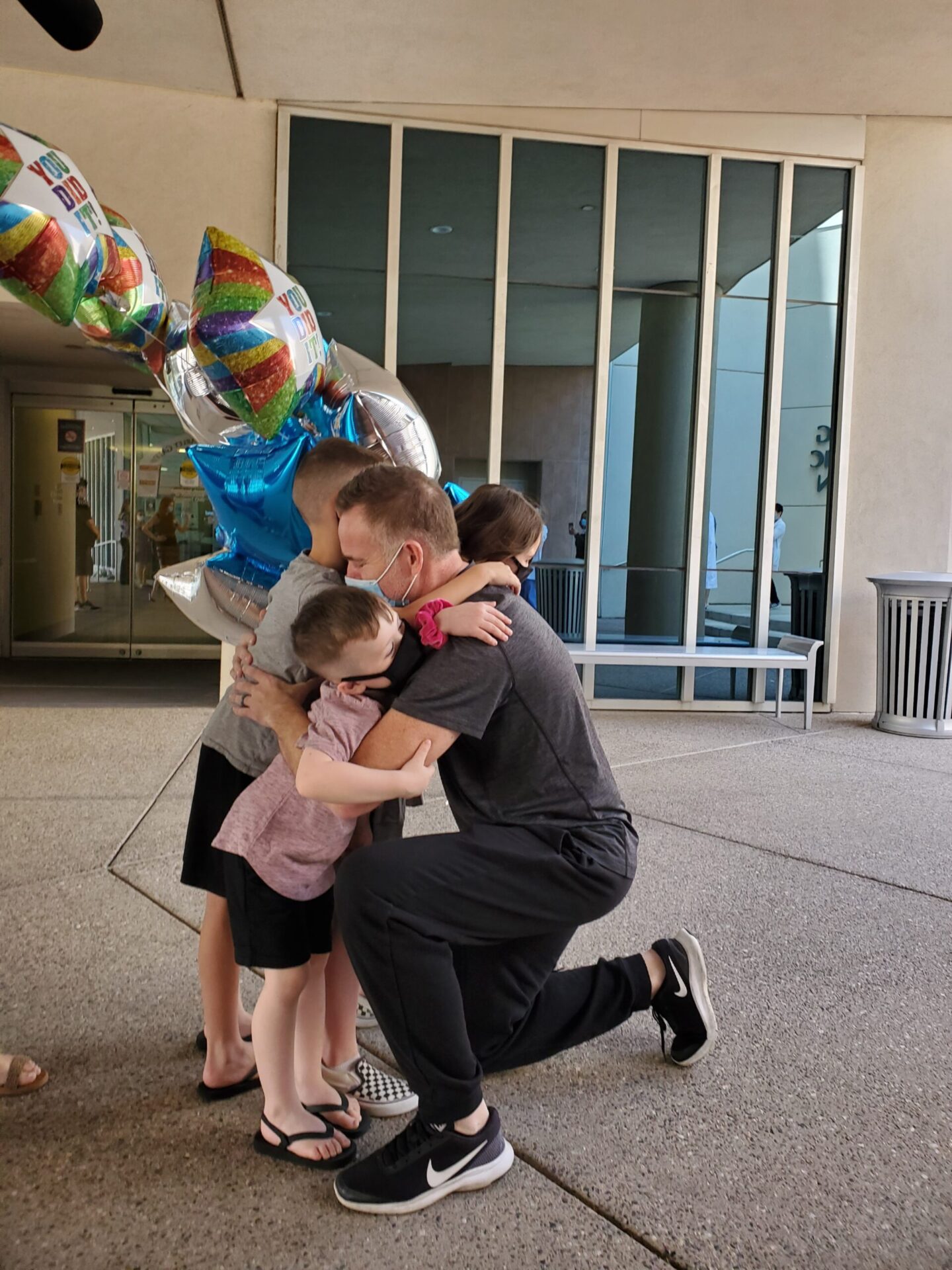
A young Chandler physician who was given a nearly 100 percent death prognosis from COVID-19 has made an extraordinary recovery thanks to a last-resort, lifesaving medical intervention at Dignity Health St. Joseph’s Hospital and Medical Center.
And, with timing involved in so many of life’s unexpected events, it was just in time for Father’s Day.
After nearly two months of being hospitalized, Dr. Karl Viddal was released from St. Joseph’s and reunited with his family.
“I can’t wait to see my wife and kids after spending almost eight weeks in the hospital. It’s hard to believe this happened to me, said Viddal. “I’m young and without any past medical issues, and this virus nearly ended my life,” said Viddal, 46, who was in top health prior to contracting COVID-19.
“The nurses and doctors have been incredible. They’ve literally saved my life. I’m so grateful to the medical team that cared for me. They literally had to navigate through uncharted waters. If it wasn’t for their early interventions, I wouldn’t have made it. They gave me a second chance.”
Doctors are calling Viddal’s recovery “remarkable” after he spent 28 days in a medically induced coma, 34 days on a ventilator and a total of 55 days in the hospital fighting for his life.
They credit a lifesaving intervention called ECMO for his significant outcome.
ECMO, for extracorporeal membrane oxygenation, essentiall takes over and does the work of failing lungs. Few hospitals have an ECMO program, resulting in Viddal being only the 32nd patient in the United States and the second in Arizona to be placed on ECMO therapy for COVID-19.
He spent 16 days on the device—more than any other COVID-19 patient on the lifesaving machine in Arizona.
Physicians said Viddal faced nearly 100 percent mortality within 24 to 48 hours if not for the immediate and lifesaving ECMO intervention. He’s believed to be among the nation’s most critically ill COVID-19 patients to make such a recovery.
“Using ECMO allowed us to rest Karl’s lungs,” said Dr. Raed Suyyagh, intensivist and medical director of the ECMO program at St. Joseph’s Norton Thoracic Institute.
“It is a very specialized medical treatment and is only used after all other conventional treatments have failed. We were going to do everything possible to help Karl fight this illness.”
Viddal, a family practice physician, began experiencing flu-like symptoms days after returning from a trip abroad in March. Within days, his health began to rapidly decline and he was admitted on March 22 to Dignity Health Mercy Gilbert Medical Center.
The illness was already so deep in his lungs that it did not present in his nasal cavity for some time. As a result, he had three false-negative results before testing positive for COVID-19 through a bronchoscopy specimen.
While at Mercy Gilbert, Viddal relied on a ventilator at maximum support to help him breathe due to severe pneumonia caused by the virus. The medical staff at Mercy Gilbert called on the experts from Norton Thoracic Institute as the condition of Viddal’s lungs continued to worsen and it became clear he needed a higher level of care.
“Dr. Chirag Patel, one of our Norton surgeons at Dignity Health, went to Mercy Gilbert and placed Karl on the EMCO machine, and then helped a skilled team from Norton coordinate the state’s first ECMO transfer from Mercy Gilbert to St. Joseph’s,” said Dr. Ross Bremner, thoracic surgeon and director of the Norton institute.
“This kind of transport is incredibly complex, but it is something our team has experience with because of our lung transplant program.”
In addition to the ECMO treatment, Viddal also underwent repeated prolonged bronchoscopies and had a tracheostomy and a chest tube placed while hospitalized. Suyyagh, the hospital’s ECMO director, said these additional procedures may have been largely avoided at many other medical centers due to the higher-risk for staff exposure to the virus.
“Thankfully, we had the proper PPE and re-designed intubation boxes for the team to safely perform these ultimately lifesaving tasks,” he added. Viddal was also given two doses of a drug commonly used for rheumatoid arthritis, tocilizumab, to help treat the pneumonia.
“It was hard comprehending what happened to me when I became conscious. I woke up and I was paralyzed, unable to speak,” Viddal explained.
“I feel blessed to have such incredible nurses and doctors. They never gave up on me and I am optimistic I will make a full recovery.”
Once off the ECMO machine and the ventilator, Viddal was transferred to the hospital’s inpatient neuro-rehabilitation program managed by St. Joseph’s Barrow Neurological Institute. After less than two weeks of intensive physical and occupational therapy, Viddal regained enough strength and balance to safely walk on his own again and return home.
“Karl is a true warrior,” said Viddal’s wife, Alyssa Viddal. “The kids and I have been counting down since he started rehab. After 55 days in the hospital, we can’t wait to have him home.”

